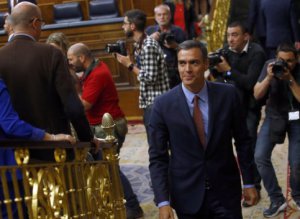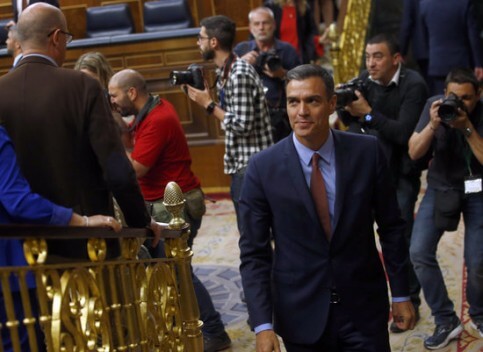From Monday to Thursday, Spain’s acting prime minister Pedro Sánchez will try to win the support of the Spanish Congress to remain in power for a second term – but it is not clear if he will succeed. And disagreement over the solution to the Catalan independence issue might be partly responsible for that.
The debate will begin on Monday at noon with a statement by the Socialist (PSOE) candidate for prime minister, followed by a discussion with all of the chamber’s groups.
The first round of votes will be held on Tuesday 23 July, and Sánchez will need an absolute majority of seats to succeed. If he fails, a second round will take place on Thursday 25 July, where a simple majority will be enough.
ALSO READ: Pedro Sánchez: Catalonia is main obstacle to left-wing coalition
Here are the five key points on what to expect of the debate:
1. Not a clear bid
Sánchez needs the support of left-wing Podemos party and some of the chamber’s smaller groups, but whether he will receive it is unclear.
Unless there is an eleventh-hour deal, the PSOE and Podemos won’t be able to strike a deal – the latter asked for its leader, Pablo Iglesias, to be deputy PM, but Sánchez said he would only accept a coalition government with some of Podemos’ members, not including their head.
On Friday evening Iglesias said he would not step in the way of an agreement if he is the main obstacle to it, but did not back down on his demand to have some of his party members in the cabinet.
ALSO READ: PSOE opens door to coalition ‘scenarios’ with Podemos

2. Catalonia and the Spanish left-wing rift
The Catalan issue is one of the topics that causes the most distance between both mainstream Spanish left-leaning forces. The Socialists favoured the suspension of Catalonia’s self-rule (via Article 155) as a result of the 2017 independence bid, while Podemos was against it.
Indeed, Pedro Sánchez admitted on Thursday that the main obstacle to accepting Iglesias in his government is his stance on Catalonia.
Talking to La Sexta TV channel, Sánchez said that ‘the conditions for making Iglesias a cabinet member do not exist,’ due to his defence of jailed Catalan independence leaders as ‘political prisoners’, and his support for a self-determination referendum in Catalonia.
ALSO READ: Could Spain be heading for yet another General Election?
3. Pro-independence parties’ uncertain stance
The two Catalan pro-independence parties in the Spanish Congress might be key for Sánchez’s bid to remaining in power for a second term.
On Friday, after separate meetings, neither of them wanted to clarify their stance – yet the Esquerra Republicana (ERC) party said that it would be a ‘historic mistake’ to contribute to the failure of a left-wing government leading to a snap election and a potential victory for the right.
Junts per Catalunya (JxCat) officials said they would decide on Monday after listening to Sánchez’s opening statement, but added they have ‘a lot of reasons to vote No.’ The abstention of one of them could be enough for Sánchez.
ALSO READ: Sánchez a ‘felon, illegitimate, traitor’ for Catalan ‘rapporteur’
4. Independence issue poised to be top topic in debate
The Catalan independence issue is expected to the most debated issue, as it was in the recent Spanish electoral campaign and over the past few years.
ALSO READ: Focus: Why Catalonia is key to the investiture of Pedro Sánchez
Right-wing Ciudadanos (Cs), the People’s Party (PP) and the far-right Vox party, all accuse the Socialists of allying and working with pro-independence parties, which they call ‘coup-mongers,’ on the grounds that Sánchez ousted right-wing leader Mariano Rajoy with their support.
ALSO READ: Spain’s right and far-right unite at Madrid rally
They have also harshly criticised the fact that Sánchez has twice met with the Catalan president, Quim Torra, over the past year.
At the other end of the political arena, the pro-independence MPs will show outrage at the imprisonment of their leaders and the rebellion and sedition allegations, as well as at the fact that five of them were suspended as Spanish MPs shortly after taking up their seats.
ALSO READ: Catalonia: the ‘electoral weapon’ in Andalusia
5. Clock running towards automatic snap election
If Pedro Sánchez misses this opportunity to continue as Spanish prime minister, MPs will have two months to find consensus over a candidate. If they fail to do so, a snap election will be automatically called in mid-September for 10 November 2019.
The debate might be key for parties ahead of a potential second electoral campaign.
ALSO READ: Sánchez ‘rollercoaster’ and Spain’s ‘political instability’


